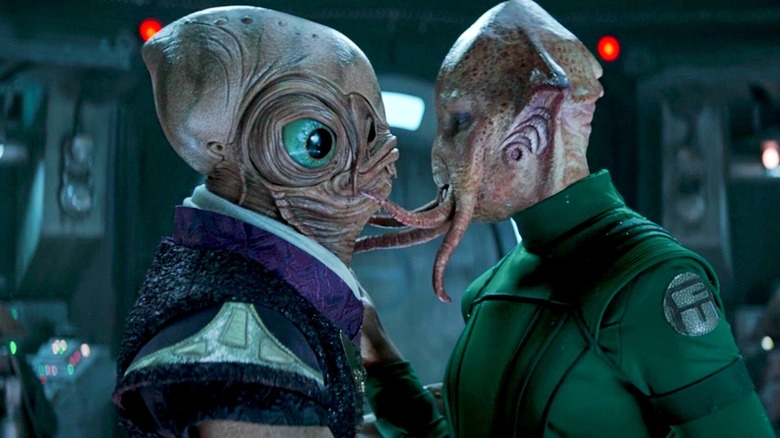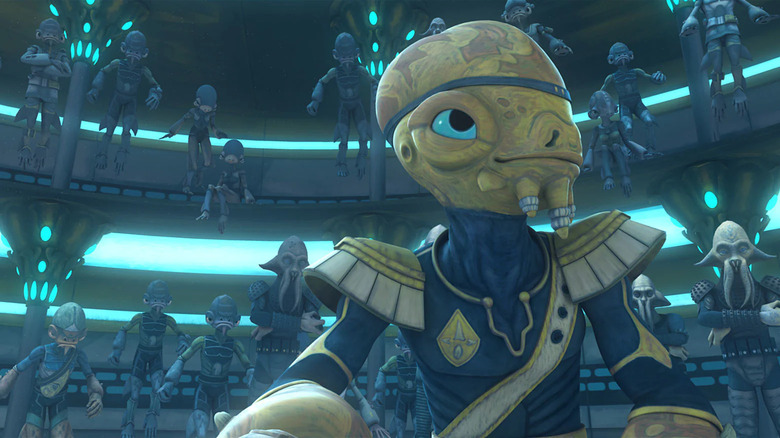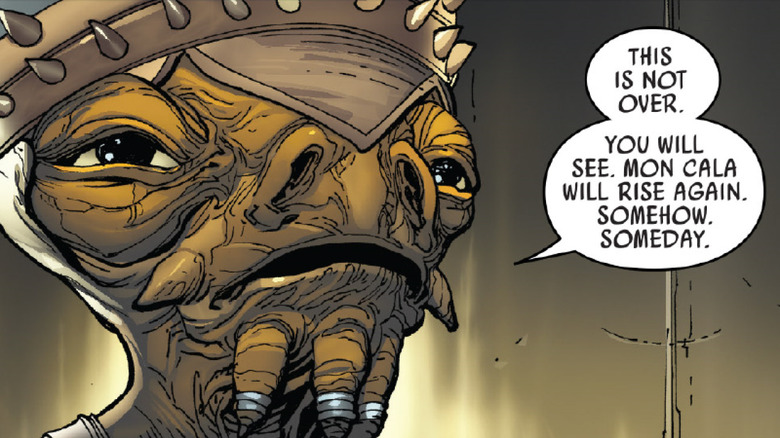How The Mandalorian's Romeo And Juliet Romance Connects To The Clone Wars
This post contains spoilers for "The Mandalorian" season 3, episode 6, "Guns for Hire."
Chapter 22 of "The Mandalorian" begins by alluding to a much larger story than we're privy to. We're shown a freighter that bears all of the design hallmarks of coming from the planet Mon Cala and discover that a Quarren crew is in charge of it.
For many ages, the Quarren and the Mon Calamari have shared a planet, but little else. They've been locked in conflict and at odds with each other. It feels like it would be the perfect planet for two aquatic species to have a "Romeo and Juliet" love story and Jon Favreau delivers on it in this new chapter. Very quickly, we discover that there's a Mon Cal prince aboard the ship and the Mandalorian privateers, led by Axe Woves, have been hired by his father to return him home. He doesn't want to go because he's in love with the captain, but the Mandalorian mercenaries aren't exactly concerned about that.
It's a tale as old as time, and the story of "Romeo and Juliet" has been retold over and over again in many forms, from "West Side Story" and "Romeo Must Die" all the way to the zombie film "Warm Bodies." It's no stranger to "Star Wars," either, as elements of the story even found their way into the narrative thread involving Anakin Skywalker and Padmé Amidala.
In many versions of "Romeo and Juliet", especially the original, the lovers are killed for their forbidden romance, usually by their own hand. Fortunately, the story hinted at here in "The Mandalorian" doesn't end so tragically. The prince is taken from his love, the Quarren captain, and they're separated for the time being. Whether it turns to tragedy or not in the future is anyone's guess.
But how does this "Romeo and Juliet" story in "The Mandalorian" all tie back to events across other "Star Wars" media?
Prince Lee-Char
In "Star Wars: The Clone Wars," we were introduced to a character named Prince Lee-Char — a Mon Cal royal who seems to have held the same title as the nameless prince in this episode of "The Mandalorian" — whose father had been assassinated. Lee-Char, too young for the task before him, struggled with the throne. With the Separatists working behind the scenes to sway the Quarren people on the planet and create a larger rift between them, Lee-Char relied on the Jedi and the Republic for help, though it caused an all-out war.
The royal title of the Mon Calamari people, at least in Lee-Char's time, was passed down through generations, which leads one to believe that this prince might very well be a relative of Lee-Char's.
Lee-Char became the ruler of Mon Calamari during the dark times of the Empire. Advised by a Jedi on the run after the great purge, Mon Calamari tried to refuse the dictates of the Empire, but eventually, there was no choice. Darth Vader and Grand Moff Tarkin arrived, bombarded the planet and took Lee-Char prisoner, where he withered away.
Lee-Char's Descendants
After the Battle of Yavin, Princess Leia sought to rescue Lee-Char from the Imperial prison where he'd been held, but his health had deteriorated to the point where he was on his death bed. In his final hours, he recorded a message that led to the mutiny of Mon Calamari against the Empire, and that's why the Mon Calamari ships were brought into the service for the Rebellion and used to full effect by the time of the Battle of Endor.
There's no record in the canon of "Star Wars" that shows us that Lee-Char had any children to pass his title to. In fact, the last message he delivered that aided the Rebellion was delivered by a regent of the planet. Did that mean there were no royals left in Lee-Char's line and the regent became the royal family after Lee-Char's death? Or did Lee-Char have children and could this be his son, or even his grandson?
It's hazy, and something tells me we won't get more answers about the politics of Mon Calamari on "The Mandalorian" but it's fertile territory for more storytelling for sure.
"Star Wars: The Mandalorian" is streaming on Disney+. New episodes arrive on Wednesdays.


